-
Why Climate and Conflict Are Shaping the Crises of Our Time (And What To Do About It)
› Humanitarian need is increasing. Crises are becoming more complex through the interactions between climate change, disasters, and conflicts. Not only are humanitarian crises on the rise, but the nature of crises is changing, largely due to climate change-driven extremes such as floods, droughts and typhoons. Over 90 percent of disasters are believed to be related to climate.
Humanitarian need is increasing. Crises are becoming more complex through the interactions between climate change, disasters, and conflicts. Not only are humanitarian crises on the rise, but the nature of crises is changing, largely due to climate change-driven extremes such as floods, droughts and typhoons. Over 90 percent of disasters are believed to be related to climate. -
Wim Zwijnenburg on Using Data to Visualize the Impacts of Conflict on the Environment
› Through open source information, remote sensing, and existing data, we can have a better sense of how conflict impacts the environment and how it then impacts people depending on the environment, said Wim Zwijnenburg, a Humanitarian Disarmament Project Leader for the Dutch peace organization, PAX, in this week’s Friday Podcast. Wim sat down for an interview with ECSP’s Amanda King at the first International Conference on Environmental Peacebuilding, hosted at the University of California, Irvine, in October 2019.
Through open source information, remote sensing, and existing data, we can have a better sense of how conflict impacts the environment and how it then impacts people depending on the environment, said Wim Zwijnenburg, a Humanitarian Disarmament Project Leader for the Dutch peace organization, PAX, in this week’s Friday Podcast. Wim sat down for an interview with ECSP’s Amanda King at the first International Conference on Environmental Peacebuilding, hosted at the University of California, Irvine, in October 2019. -
Dr. Mishkat Al-Moumin on the Importance of Women & the Environment to Sustainable Peace
› “I believe if you acknowledge women as primary users of environmental resources, if you draft the policy with women [at] the table, offering you their unique perspective and unique feedback, you’re going to have a more stable policy. A policy that gets implemented,” says Mishkat Al-Moumin, scholar in residence at the Environmental Law Institute, in this week’s Friday Podcast, and second in a series of interviews recorded at the First International Conference on Environmental Peacebuilding.
“I believe if you acknowledge women as primary users of environmental resources, if you draft the policy with women [at] the table, offering you their unique perspective and unique feedback, you’re going to have a more stable policy. A policy that gets implemented,” says Mishkat Al-Moumin, scholar in residence at the Environmental Law Institute, in this week’s Friday Podcast, and second in a series of interviews recorded at the First International Conference on Environmental Peacebuilding. -
To Envision a More Sustainable Future Tell the Story of Conservation Technology
› Last summer, I stood on a cliff 100 feet above the Madre De Dios River, in Southern Peru near the Bolivian border, to watch the rosy gift of an Amazon sunset. It was quiet, in a tropical rainforest way, with the light clamor of parrots, macaws, and cicadas. Then, a peke-peke motorized canoe broke through the soft din. It arrived from the east, carrying a new supply of diesel fuel for the gold miners who were prepping the generator that would operate a suction-pump and dredge for gold across the river and around the bend. Before nightfall, the fuel ignited the baritone of a diesel generator. It moaned all night and all day, barely stopping. In subsequent days, instead of a light clamor of birds and primates, the thrum of a gold mining operation seemed like all I could hear.
Last summer, I stood on a cliff 100 feet above the Madre De Dios River, in Southern Peru near the Bolivian border, to watch the rosy gift of an Amazon sunset. It was quiet, in a tropical rainforest way, with the light clamor of parrots, macaws, and cicadas. Then, a peke-peke motorized canoe broke through the soft din. It arrived from the east, carrying a new supply of diesel fuel for the gold miners who were prepping the generator that would operate a suction-pump and dredge for gold across the river and around the bend. Before nightfall, the fuel ignited the baritone of a diesel generator. It moaned all night and all day, barely stopping. In subsequent days, instead of a light clamor of birds and primates, the thrum of a gold mining operation seemed like all I could hear. -
The Top 5 Posts of January 2020
›
The world’s largest greenhouse gas emitter, China, is projected to fulfill its Paris commitment to reduce the proportion of coal in its energy mix ten years ahead of schedule. However, the country remains the world’s largest producer and consumer of coal, and coal conversion practices are steadily on the rise. In this month’s top post, China Environment Forum’s Richard Liu, Zhou Yang, and Xinzhou Qian track China’s risky gamble on coal conversion.
-
Geoff Dabelko and Sharon Burke on Environmental Peacebuilding in an Era of Great Power Competition
› United States and China are on the road to war, said Senior Advisor of New America’s Resource Security Program, Sharon Burke in this week’s Friday Podcast. “And if you’re an environmental peacebuilder and you’re not thinking about that, you might want to,” she added. She spoke with Geoffrey Dabelko, Professor at Ohio University and Senior Advisor to ECSP, at the first ever International Conference on Environmental Peacebuilding in October 2019 at the University of California, Irvine. It’s a war we can’t afford, said Burke. “But we’re not doing anything to avoid it at the moment, in my opinion, other than deterrence.”
United States and China are on the road to war, said Senior Advisor of New America’s Resource Security Program, Sharon Burke in this week’s Friday Podcast. “And if you’re an environmental peacebuilder and you’re not thinking about that, you might want to,” she added. She spoke with Geoffrey Dabelko, Professor at Ohio University and Senior Advisor to ECSP, at the first ever International Conference on Environmental Peacebuilding in October 2019 at the University of California, Irvine. It’s a war we can’t afford, said Burke. “But we’re not doing anything to avoid it at the moment, in my opinion, other than deterrence.” -
To Reduce Future Conflicts over Water, Reconceptualize “Shared Waters”
› In the years ahead, climate change and the proliferation of new technologies and information availability will require us to reshape our vision of shared waters. Because these megatrends are experienced in concert, the opportunities, challenges, and uncertainties for shared water management will continue to compound over time.
In the years ahead, climate change and the proliferation of new technologies and information availability will require us to reshape our vision of shared waters. Because these megatrends are experienced in concert, the opportunities, challenges, and uncertainties for shared water management will continue to compound over time.While it is impossible to know precisely how shared water will look in the future, we should already be working to expand how we conceptualize shared waters, address inequities embedded within water management, and develop criteria and processes that successfully identify and include non-traditional shared water actors in decision-making. These shifts will strengthen our ability to generate creative and sustainable management strategies and help us avoid water-related conflicts.
-
It’s Time We Think Beyond “Threat Multiplier” to Address Climate and Security
› If you have even a passing familiarity with the climate and security literature, you undoubtedly have come across the phrase “threat multiplier.” The phrase conveys the idea that climate change intersects with other factors to contribute to security problems. It’s used as short-hand to avoid the charge of environmental determinism, that climate change somehow on its own causes negative security outcomes.
If you have even a passing familiarity with the climate and security literature, you undoubtedly have come across the phrase “threat multiplier.” The phrase conveys the idea that climate change intersects with other factors to contribute to security problems. It’s used as short-hand to avoid the charge of environmental determinism, that climate change somehow on its own causes negative security outcomes.The 2007 CNA Military Advisory Board (MAB) report on climate security introduced this formulation and, at the time, it served the purpose of recognizing that there is a link between climate change and security. But research on climate security has progressed and so must our framing of the risks and needed interventions.
Showing posts from category environmental security.


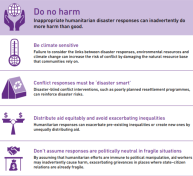 Humanitarian need is increasing. Crises are becoming more complex through the interactions between climate change, disasters, and conflicts. Not only are humanitarian crises on the rise, but the nature of crises is changing, largely due to climate change-driven extremes such as floods, droughts and typhoons. Over
Humanitarian need is increasing. Crises are becoming more complex through the interactions between climate change, disasters, and conflicts. Not only are humanitarian crises on the rise, but the nature of crises is changing, largely due to climate change-driven extremes such as floods, droughts and typhoons. Over  Through open source information, remote sensing, and existing data, we can have a better sense of how conflict impacts the environment and how it then impacts people depending on the environment, said Wim Zwijnenburg, a Humanitarian Disarmament Project Leader for the
Through open source information, remote sensing, and existing data, we can have a better sense of how conflict impacts the environment and how it then impacts people depending on the environment, said Wim Zwijnenburg, a Humanitarian Disarmament Project Leader for the  “I believe if you acknowledge women as primary users of environmental resources, if you draft the policy with women [at] the table, offering you their unique perspective and unique feedback, you’re going to have a more stable policy. A policy that gets implemented,” says Mishkat Al-Moumin, scholar in residence at the Environmental Law Institute, in this week’s Friday Podcast, and second in a series of interviews recorded at the First International Conference on Environmental Peacebuilding.
“I believe if you acknowledge women as primary users of environmental resources, if you draft the policy with women [at] the table, offering you their unique perspective and unique feedback, you’re going to have a more stable policy. A policy that gets implemented,” says Mishkat Al-Moumin, scholar in residence at the Environmental Law Institute, in this week’s Friday Podcast, and second in a series of interviews recorded at the First International Conference on Environmental Peacebuilding.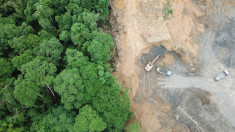 Last summer, I stood on a cliff 100 feet above the Madre De Dios River, in Southern Peru near the Bolivian border, to watch the rosy gift of an Amazon sunset. It was quiet, in a tropical rainforest way, with the light clamor of parrots, macaws, and cicadas. Then, a peke-peke motorized canoe broke through the soft din. It arrived from the east, carrying a new supply of diesel fuel for the gold miners who were prepping the generator that would operate a suction-pump and dredge for gold across the river and around the bend. Before nightfall, the fuel ignited the baritone of a diesel generator. It moaned all night and all day, barely stopping. In subsequent days, instead of a light clamor of birds and primates, the thrum of a gold mining operation seemed like all I could hear.
Last summer, I stood on a cliff 100 feet above the Madre De Dios River, in Southern Peru near the Bolivian border, to watch the rosy gift of an Amazon sunset. It was quiet, in a tropical rainforest way, with the light clamor of parrots, macaws, and cicadas. Then, a peke-peke motorized canoe broke through the soft din. It arrived from the east, carrying a new supply of diesel fuel for the gold miners who were prepping the generator that would operate a suction-pump and dredge for gold across the river and around the bend. Before nightfall, the fuel ignited the baritone of a diesel generator. It moaned all night and all day, barely stopping. In subsequent days, instead of a light clamor of birds and primates, the thrum of a gold mining operation seemed like all I could hear.
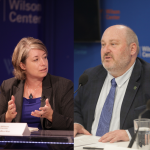 United States and China are on the road to war, said Senior Advisor of New America’s
United States and China are on the road to war, said Senior Advisor of New America’s 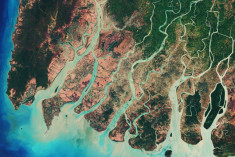 In the years ahead, climate change and the proliferation of new technologies and information availability will require us to reshape our vision of
In the years ahead, climate change and the proliferation of new technologies and information availability will require us to reshape our vision of 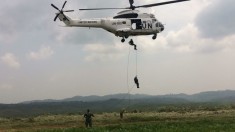 If you have even a passing familiarity with the climate and security literature, you undoubtedly have come across the phrase “
If you have even a passing familiarity with the climate and security literature, you undoubtedly have come across the phrase “

